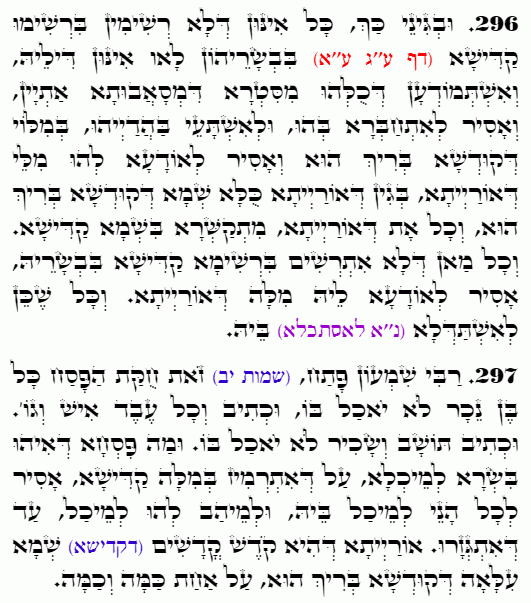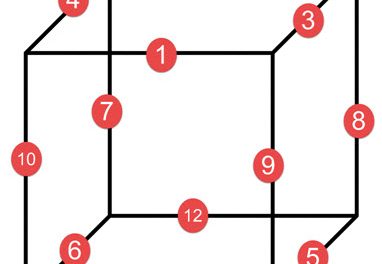Daily Zohar # 4680 – Acharei Mot – Who can eat the ‘sacred food’
Daily Zohar 4680

Hebrew translation:
297. רַבִּי שִׁמְעוֹן פָּתַח, (שמות יב) זֹאת חֻקַּת הַפָּסַח כָּל בֶּן נֵכָר לֹא יֹאכַל בּוֹ, וְכָתוּב וְכָל עֶבֶד אִישׁ וְגוֹ’, וְכָתוּב תּוֹשָׁב וְשָׂכִיר לֹא יֹאכַל בּוֹ. וּמַה פֶּסַח שֶׁהוּא בָּשָׂר לְמַאֲכָל, עַל שֶׁנִּרְמָז בְּדָבָר קָדוֹשׁ אָסוּר לְכָל אֵלֶּה לֶאֱכֹל בּוֹ וְלָתֵת לָהֶם לֶאֱכֹל עַד שֶׁיִּמּוֹלוּ – הַתּוֹרָה שֶׁהִיא קֹדֶשׁ קָדָשִׁים (שֶׁל קָדָשִׁים), הַשֵּׁם הָעֶלְיוֹן שֶׁל הַקָּדוֹשׁ בָּרוּךְ הוּא, עַל אַחַת כַּמָּה וְכַמָּה.
.
Zohar Acharei Mot
Continued from previous DZ
#296
And because of this, all those who are not marked with the holy sign (ברית מילה) in their flesh, meaning those who are not circumcised, do not belong to Him, the Holy One, Blessed be He, and it is recognized that they all come from the side of impurity. It is forbidden to join with them or speak with them concerning the matters of the Holy One, Blessed be He, and it is not permitted to teach them words of Torah. This is because the Torah is entirely the Name of the Holy One, Blessed be He, and every letter in the Torah is connected to the holy Name. Therefore, anyone who is not marked with the holy Name in their flesh must not be taught the words of the Torah. All the more so, it is forbidden to engage with them in Torah study.
Notes:
The passage reflects the deep reverence for the Torah and Hashem’s Name. It upholds a clear boundary around transmitting divine knowledge, reserving it only for those who have entered the sacred covenant through circumcision. Doing so safeguards the sanctity of the Torah and the higher connection it represents.
This teaching reinforces the idea that connecting to the covenant (through circumcision) is essential for engaging in the sacred studies of the Torah, as it ensures that one is spiritually prepared and aligned with the holy.
#297
Rabbi Shimon opened with the verse: “זֹאת חֻקַּת הַפָּסַח כָּל בֶּן נֵכָר לֹא יֹאכַל בּוֹ” “This is the statute of the Passover: No foreigner shall eat of it.” (Exodus 12:43). And it is written, “וְכָל עֶבֶד אִישׁ” “And every man’s servant…” (Exodus 12:44), and it is written,” תּוֹשָׁב וְשָׂכִיר לֹא יֹאכַל בּוֹ” “A sojourner and a hired worker shall not eat of it.” (Exodus 12:45). And if the Passover offering, which is merely meat for consumption, and because it alludes to something holy — that is, because Hashem passed over the doorposts (in Egypt) — it is forbidden for all these (foreigners and non-circumcised) to eat of it or for one to give it to them to eat until they are circumcised. The Torah, which is the Holy of Holies, which is the supreme Name of the Holy One, Blessed be He — how much more so is it forbidden to teach them?
Notes:
Rabbi Shimon points out that if something as simple as the Passover meal, which is physical food, is restricted due to its spiritual meaning, then certainly the Torah, which is infinitely holier and directly associated with Hashem’s supreme Name, should be even more guarded. The Torah, described as “the Holy of Holies,” represents God’s divine wisdom and essence. Hence, it is inappropriate to share the Torah’s teachings with those who are not spiritually aligned with its sanctity, specifically those who have not entered into the covenant through circumcision.
Rabbi Shimon draws a parallel between the restrictions on who may partake in the Passover offering and who may engage with the Torah, underscoring the need for spiritual readiness and sanctity before interacting with the divine. The Torah is not just knowledge but a sacred entity that demands purity and alignment with the covenant to access it properly.
In our times, many non-Jews are drawn to the study of the Torah, and this often indicates that their soul has an inherent connection to the Israelite soul. Those who seek to study Kabbalah for material gain, however, are naturally unable to connect to its holiness, as their soul is not attuned to the spiritual depth of the Torah and Zohar. A non-Jew who feels a genuine love for sacred studies is very likely to possess a Jewish soul. This inner connection is often accompanied by a desire to formally convert to Judaism.
{||}

 Previous: Acharei Mot
Previous: Acharei Mot


